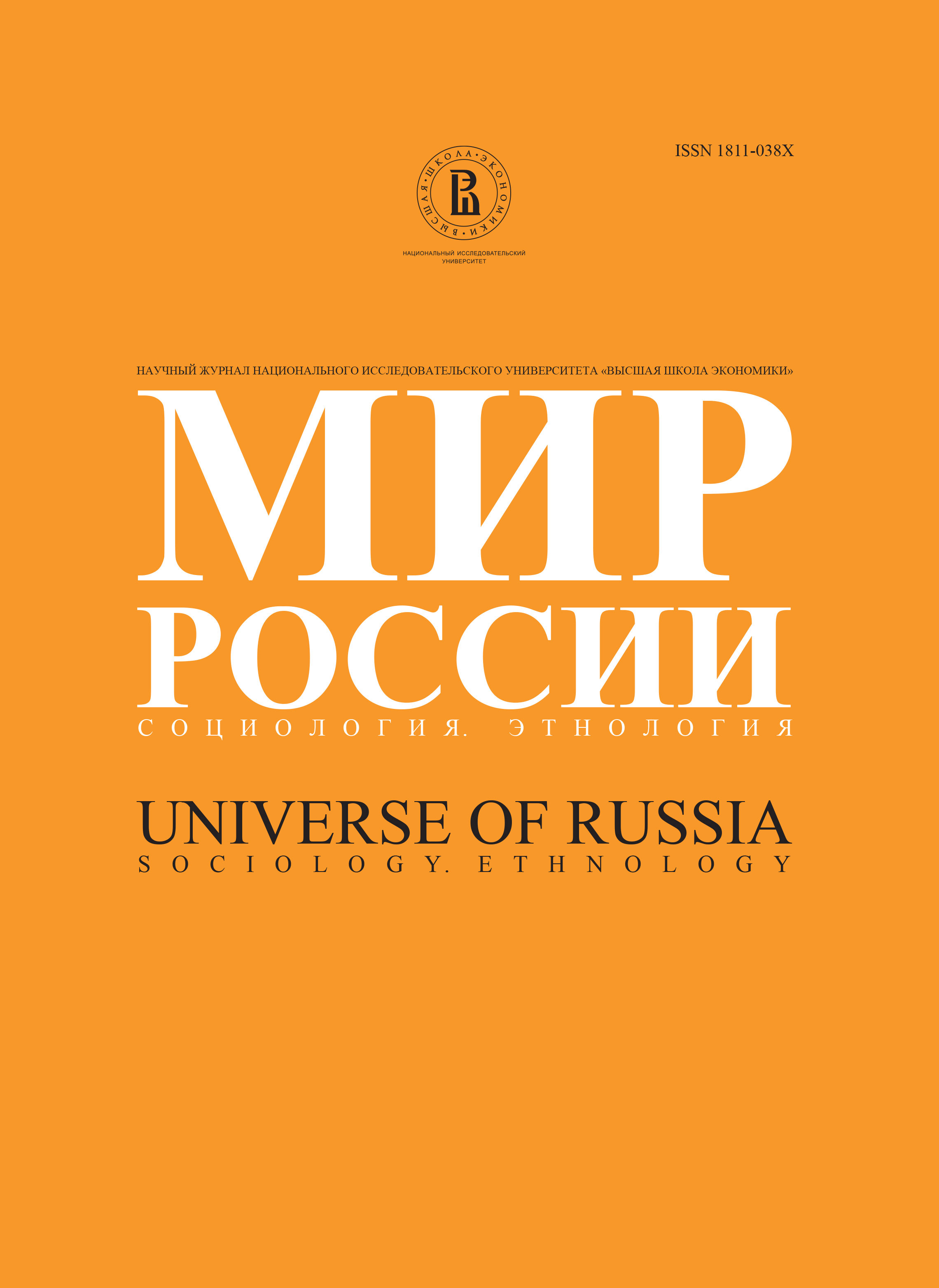Crisis Society in the Context of Socio-Cultural Transformations
Abstract
The author summarises his concept of social and cultural transformations of Russian society. He makes the following conclusion: dynamics of Russian crisis society at the border of the centuries is the form of completion of its earlier liberalisation that started in the middle of the 19th century and was interrupted by traditionalism' recurrence.The paper consists of four parts that analyse four types of problems. The first one clarifies of the essence and principles of socio-cultural approach towards the society transformation. The second deals with the ways of transition from traditionalism to liberalisation in Western countries and pre-Soviet Russia. The third group concerns the mechanisms of recurrent traditionalisation of Soviet society and evolution of socio-cultural crisis within it. The fourth part shows understanding of the structure and dynamics of liberalisation versus traditionalisation processes at the edge of the XXI century, their prospects in the information age, role of fundamental values in the on-going transformation.
The first part «Methodology of Studying Socio-Cultural Transformations)) shows why socio-cultural approach to the studied problem is preferable, and formulates six analytical principles used for researching it. Thus the concept of «socio-cultural transformation)) is defined; its two types are shown: traditionalisation that prioritise behaviour rules prescribed by society, and liberalisation that widen subjects' liberty. At the same time ((modernisation from the top» is considered only as one of liberalisation's aspects.
The second part «Early Liberalisation in Western Europe and Pre-Soviet Russia» shows that transformations of traditionalistic type dominated in ancient and antique times, in the Middle Ages in various societies, including those of Western Europe. Since the 16th century new protoliberalisation appeared in Western Europe, while early liberalisation began in the 17th century. It relied upon passionar rise of new personality forces of the Renaissance epoch and meant emergence of new differentiations and increasing variation of social structures. Three revolutions - scientific, industrial and democratic - became its key phases. Rapid expansion and differentiation of market system, society's transformation from rural to industrial and urbanised, from estate society, to class society became the most important integrators of new social space. New reasons for disintegration emerged as well: for the employed workers liberalisation turned into their increased alienation, from the means and results of labour; military and political confrontation between the countries became global.
It is shown that early liberalisation in Western Europe as in culturally homogeneous group of countries lasted more than 300 years, though in each country it had its own way of development. Great Britain became homeland for natural liberalisation, being its classical example, and leading almost all the time. Liberal transformation in France started later, was performed in a less organised and more dramatic way. In Germany processes of spiritual protoliberalisation took several centuries, and socio-cultural balance was established there only in the second half of the 20th century. But not all the countries of Western Europe manage to complete early liberalisation in the 20th century.
Traditionalism in Russia after it was brought into subjection to the Golden Horde got asymmetric Eurasian orientation. Later the pendulum shift of traditionalistic and liberal orientations was formed; each cycle ended up with crisis of traditionalism, the most important of them are the Great Riot, Decembrists' revolt, Russia's defeat in the Crimean war. The last became a deadlock that stimulated the ruling circles to initiate the shift from protoliberal reforms going «from the top» (those of Peter I, Catherine II and others) to early liberalisation as a complex process (reforms of Alexander II: abolishing of serfdom, etc.). With assassination of Alexander II a destructive triad: liberal reforms - terror - traditionalistic counter reforms emerged, which was repeated with Stolypin reforms. Russian army defeat at the war with Germany stimulated revolutionary mutinies against traditionalism of 1917.
The third part ((Mobilising Traditionalisation, Total Alienation and Pathological Crisis of Soviet Society)) reviews socio-cultural mobilisation or mass-mythologised way for achieving the goals of Communist elite as a starting point for recurrent traditionalisation of Soviet society. The cycles including such types of mobilisation as existential-traditionalistic, passionar, system-supporting and others are revealed. Their two major consequences are disclosed: total alienation of a Soviet man and insusceptibility of etacratic system towards liberalisation, resulting in general crisis, that ended up in the USSR collapse both as a state and a society.
The forth part «Early Liberal Transformation into Information Age» shows that post-Soviet society faces the problem of choosing socio-cultural orientations again. Hypothesis regarding basic values as attractors in choosing transformation type is given grounds.
Data of three representative surveys conducted under author's supervision in 1990- 1994-1998 permitted to find out the most important features of values' dynamics: their stability in conscience of Russian citizens, liberalisation of their structure and the fact that values positions of population are becoming plural. It is concluded that values conscience of Russian citizens is in the mid-way in its movement towards liberal system of values or even in the second half of this way. At the same time Russians' civil liberties are still between the autocracy of the «elites» and unlimited self-permission of the significant part of the «bottom». In general terms current stage of transformation is identified as completion of early liberalisation of large asymmetric Eurasian society.
Global context of socio-cultural choice of Russian society, new opportunities of information age are also considered. The advanced countries have entered the stage of mature liberalisation, which has the following features: shift from the change in social structures to human self-development, to man's active role in changing the existing and creation of new structures, to possibilities for overcoming man's alienation.
Informatisation assists in diffusion of new spatial logic of interaction between the subjects - so called «space of flows». Socio-cultural life now more often is regarded as emergent process open to the future.






